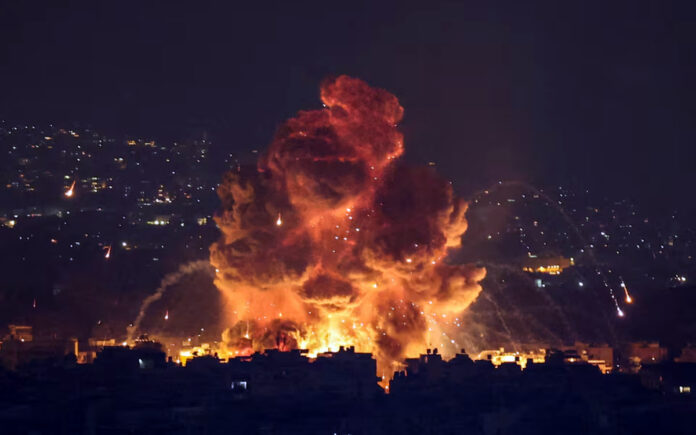Jerusalem: Israel launched airstrikes on targets in Lebanon and the Gaza Strip on Sunday, as the one-year anniversary of the October 7 attacks approaches. Israeli Defense Minister Yoav Gallant declared that all options, including military retaliation against Iran, were on the table.
Late on Sunday, Hezbollah fired rockets that penetrated Israel’s air defense systems, striking Haifa, Israel’s third-largest city, and causing significant damage to buildings, according to Israeli police. Local media reported that 10 people were injured in rocket strikes on Haifa and Tiberias. Hezbollah stated that it had targeted a military base south of Haifa with “Fadi 1” missiles.
In retaliation, Israeli airstrikes hit Hezbollah targets in Beirut’s southern suburbs, marking the most intense bombardment of the Lebanese capital since Israel escalated its campaign against the Iran-backed group last month. Fireballs illuminated the Beirut skyline as explosions echoed throughout the city.
Israel’s military reported that its fighter jets struck Hezbollah’s Intelligence Headquarters in Beirut, including weapons storage sites. Additional strikes targeted Hezbollah strongholds in southern Lebanon and the Beqaa Valley.
The anniversary marks the Hamas-led attacks on Israel from Gaza on October 7 last year. According to Israeli figures, 1,200 people were killed, and over 250 were taken hostage during the initial attack. In response, Israel launched a sustained offensive in Gaza, resulting in widespread destruction and nearly 42,000 deaths, according to Palestinian health officials.
On the eve of the anniversary, pro-Palestinian demonstrations erupted in cities worldwide, including Jakarta, Istanbul, and Rabat, with similar rallies held in major European capitals, Washington, and New York.
Tensions between Israel and Iran have escalated following a missile strike launched by Iran last week in retaliation for Israeli operations in Lebanon and Gaza, where Hezbollah and Hamas militants are Tehran’s allies under the so-called “Axis of Resistance.” Israel, which aims to ensure the safe return of its citizens to northern regions, has vowed continued retaliation amid growing concerns that the conflict could spiral into a broader regional war.
Defense Minister Gallant emphasized Israel’s independence in responding to Iran, despite coordination with the United States. “Everything is on the table,” Gallant said in an interview with CNN. “Israel has the capability to hit targets both near and far, as we have demonstrated in the past.” Gallant is scheduled to meet with U.S. Defense Secretary Lloyd Austin later this week.
Although the U.S. has not supported strikes on Iran’s nuclear sites, President Joe Biden recently suggested that Israeli attacks on Iranian oil facilities were being considered. Meanwhile, Israel dismissed U.S. efforts to mediate a ceasefire and instead launched ground operations in Lebanon.
On Sunday, the U.S. government commented on Israel’s bombardment of Lebanon, noting that while military pressure can facilitate diplomacy, it can also lead to miscalculations. French President Emmanuel Macron added that arms shipments to Israel should be halted, though Israel warned that such a move would benefit Iran.
Israel issued new evacuation orders for southern Beirut late on Sunday, signaling further strikes. Additionally, three more areas along Israel’s northern border were declared closed military zones, adding to the five zones designated last week.
Israeli airstrikes also hit several locations in Lebanon. According to the Lebanese health ministry, an Israeli strike on the mountain town of Kayfoun killed six people and injured 13, while a strike in nearby Qmatiye claimed six more lives, including three children, and wounded 11 others.
In Gaza, at least 26 people were killed and 93 injured in Israeli airstrikes targeting a mosque and a school sheltering displaced residents, according to Hamas-run media outlets. The Israeli military confirmed that the strikes targeted Hamas terrorists.
Also Read | Hezbollah Launches Missile Attack on Haifa, Tiberias; 10 Injured
Hezbollah Leadership Hit
In the midst of these developments, Hezbollah leadership has been significantly impacted. Hashem Safieddine, a senior Hezbollah official and possible successor to the group’s leader Sayyed Hassan Nasrallah—who was killed in an Israeli strike last month—was reportedly targeted in southern Beirut last week. His status remains unclear.
A joint command is reportedly overseeing Hezbollah’s operations until a new leader is appointed, according to Hezbollah official Mahmoud Qmati. He also mentioned that Israeli bombings had obstructed search efforts for Safieddine.
The conflict in Lebanon, which began a year ago with Hezbollah’s cross-border strikes in solidarity with Hamas, has dramatically intensified in recent weeks. According to Lebanon’s health ministry, over 2,000 people have been killed, with most casualties occurring in the past two weeks. On Sunday, Lebanese officials reported that 25 people had been killed in just one day.
UN officials have expressed concern over Israel’s airstrikes, with the UN refugee chief stating that many of the attacks have violated international law by targeting civilian infrastructure. Israel, however, maintains that it focuses on military targets and takes precautions to minimize civilian casualties, accusing Hezbollah and Hamas of using civilians as human shields—an allegation both groups deny.



